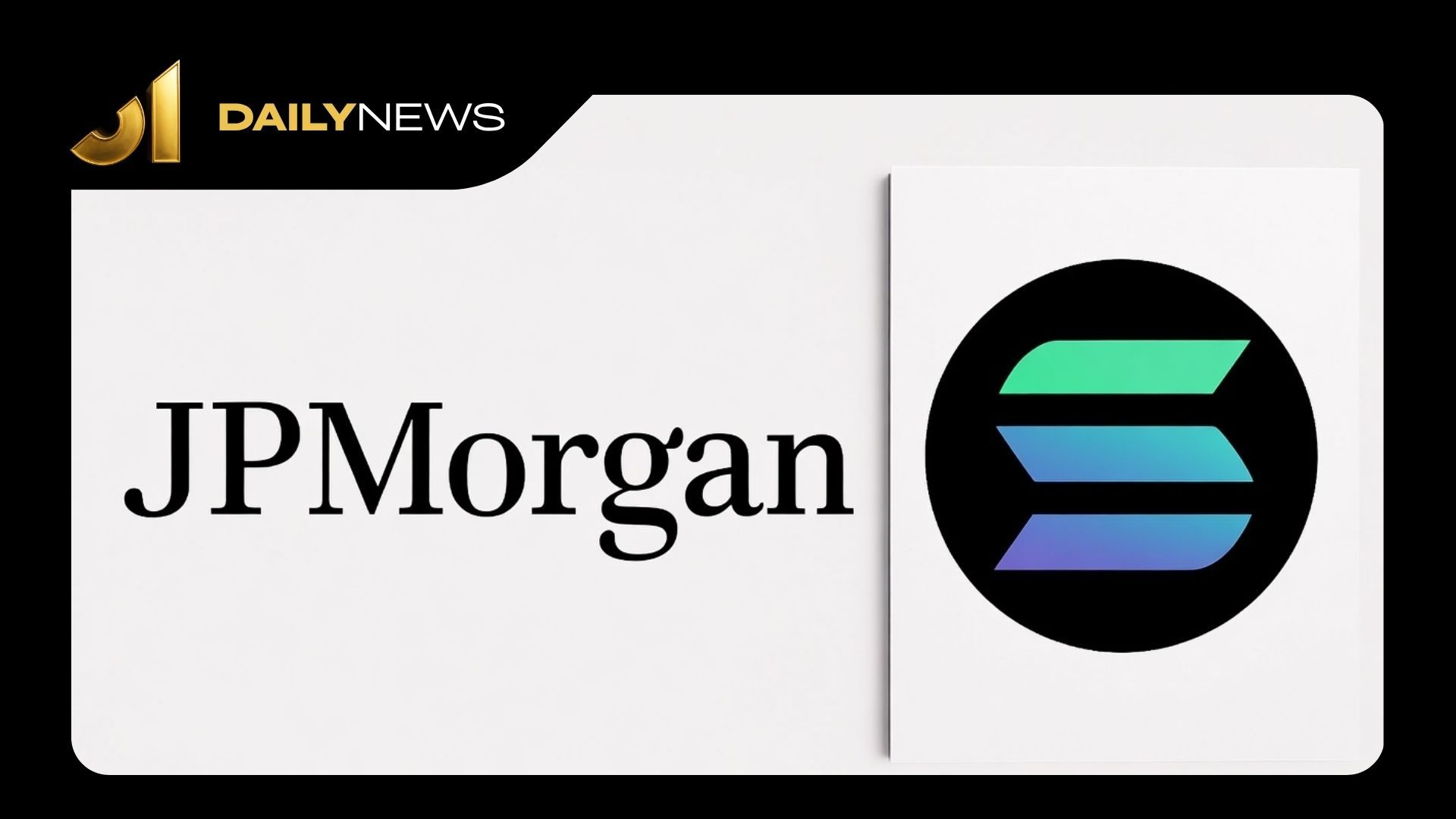Monad Launches MON Airdrop Claim Portal Next Week as JPMorgan Forecasts $1.5B Inflows for Solana ETFs
BlackRock’s Bitcoin ETF Surpasses 800,000 BTC, Luxembourg Allocates 1% to Bitcoin ETFs, Citi Ventures Backs BVNK, JPMorgan Sees Modest Solana ETF Inflows, and Monad Prepares MON Airdrop Launch

Because Bitcoin
October 9, 2025
BlackRock’s IBIT Bitcoin ETF Surpasses 800,000 BTC ($97B), Now Holds 3.8% of Total Supply
BlackRock’s spot bitcoin ETF, IBIT, has crossed 800,000 BTC ($97 billion) in assets under management less than two years after launch. The milestone came after $426 million in inflows on Wednesday, bringing IBIT’s total holdings to roughly 802,257 BTC — equivalent to 3.8% of Bitcoin’s capped 21 million supply.
IBIT now surpasses MicroStrategy’s 640,031 BTC treasury and remains the top performer among U.S. spot bitcoin ETFs, which collectively saw $440.7 million in inflows on Wednesday and $5.7 billion over the past eight days. Analysts point to strong structural demand and a calmer macro backdrop as drivers of renewed momentum, with Bloomberg’s Eric Balchunas noting that IBIT captured 10% of all ETF inflows last week. Since their debut, U.S. spot bitcoin ETFs have attracted nearly $63 billion in total inflows, with IBIT accounting for the lion’s share.
Luxembourg Sovereign Wealth Fund Allocates 1% ($9M) of Portfolio to Bitcoin ETFs in Landmark Move
Luxembourg’s Intergenerational Sovereign Wealth Fund (FSIL) has invested 1% of its €764 million ($888 million) portfolio — roughly $9 million — into Bitcoin exchange-traded funds, becoming one of the first European state-backed funds to gain BTC exposure.
The decision, revealed by Finance Minister Gilles Roth during the 2026 budget presentation, reflects Luxembourg’s push to lead in digital finance and marks a key shift in its investment strategy. The government-approved framework now allows up to 15% of FSIL’s assets to be allocated to alternative investments such as cryptocurrencies, real estate, and private equity.
Director of the Treasury Bob Kieffer said the Bitcoin exposure was made via ETFs to minimize operational risks, calling the move a “balanced step” that recognizes Bitcoin’s long-term potential while aligning with the fund’s economic and social priorities.
Ocean Protocol Exits Artificial Superintelligence Alliance to Pursue Independent Path and OCEAN Token Buybacks
Ocean Protocol Foundation has withdrawn from the Artificial Superintelligence Alliance (ASI), ending its collaboration with Fetch.ai, SingularityNET, and CUDOS. The alliance, launched in March 2024, sought to unify AI ecosystems under the rebranded ASI token — formerly Fetch.ai’s FET — through voluntary token conversions.
Ocean cited the need for independent funding, flexible tokenomics, and a new buyback-and-burn mechanism as reasons for the split, confirming that future development funding is secured. Around 81% of OCEAN’s supply has already been converted into FET, with 270 million tokens still held by over 37,000 addresses.
The ASI Alliance said Ocean’s departure was a natural transition and emphasized that its development momentum and shared mission to build decentralized AI infrastructure remain unchanged. The ASI (FET) token fell about 3.8% following the announcement.
Citi Ventures Invests in Stablecoin Infrastructure Firm BVNK as Wall Street Accelerates Blockchain Payments Push
Citigroup’s venture arm, Citi Ventures, has taken a stake in BVNK, a London-based firm building global stablecoin payment rails. While the investment amount and valuation remain undisclosed, BVNK co-founder Chris Harmse told CNBC the company is now valued above $750 million, surpassing its previous funding round. Existing backers include Coinbase, Tiger Global, Visa Ventures, and Haun Ventures.
Harmse said BVNK’s U.S. business has grown fastest over the past 18 months amid clearer regulation following the GENIUS Act, which has boosted institutional demand for stablecoin infrastructure. The move underscores Wall Street’s deeper engagement with blockchain finance as major banks explore stablecoin issuance and crypto custody.
Citi, which projects the stablecoin market could reach up to $4 trillion by 2030, joins Visa in backing BVNK as part of a broader effort to stay ahead of the payments technology shift. Meanwhile, the Bank of England is reviewing proposed caps on stablecoin holdings after industry pushback, signaling a softening stance to remain competitive with U.S. policy developments.
Monad to Launch Token Airdrop Claim Portal Next Week Ahead of Highly Anticipated Mainnet Debut
Monad announced that the first step of its long-awaited MON token airdrop will go live on Tuesday with the launch of its official claim portal. The project has not yet disclosed eligibility criteria, token supply, or distribution details, though further information on the airdrop and tokenomics will be released soon.
While many expect the airdrop to coincide with Monad’s mainnet, a project representative clarified that only the claim portal will open next week — not the mainnet or the actual token distribution.
Monad, founded in 2022 by former Jump Crypto executive Keone Hon, aims to deliver a high-performance, EVM-compatible layer-1 blockchain that rivals Ethereum and Solana. Backed by $225 million from investors led by Paradigm, Monad launched its testnet in February, supporting DeFi, NFTs, and gaming applications. Users who engaged with the testnet may be among those rewarded once the full airdrop begins.
JPMorgan Predicts Solana ETFs Will Attract Only $1.5 Billion in First-Year Inflows Despite Imminent SEC Approval
JPMorgan analysts expect upcoming spot Solana ETFs to receive modest inflows of around $1.5 billion in their first year, far below the levels seen in Bitcoin and Ethereum ETFs. The U.S. SEC is set to rule on several spot crypto ETF applications this month, with Solana’s approval widely anticipated by October 10.
The bank said approval odds are high due to the existence of CME Solana futures and the earlier launch of REX Osprey’s Solana ETF under the Investment Company Act of 1940. However, analysts cited weaker investor sentiment toward Solana, declining onchain activity, and growing competition among crypto funds as reasons for limited demand.
JPMorgan’s projection contrasts with earlier estimates from another internal team that predicted inflows between $2.7 billion and $5.2 billion within the first year if approved.

